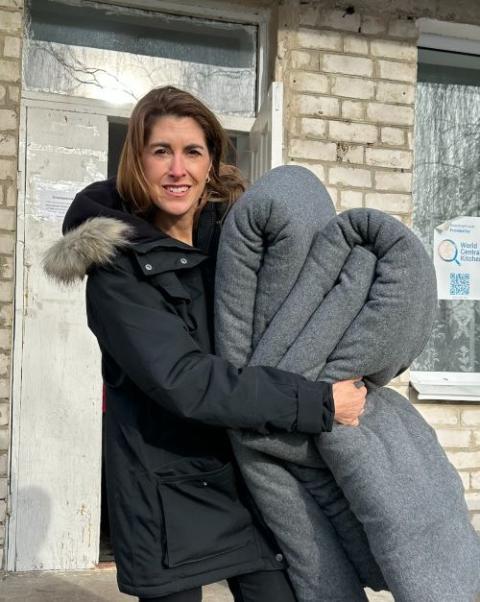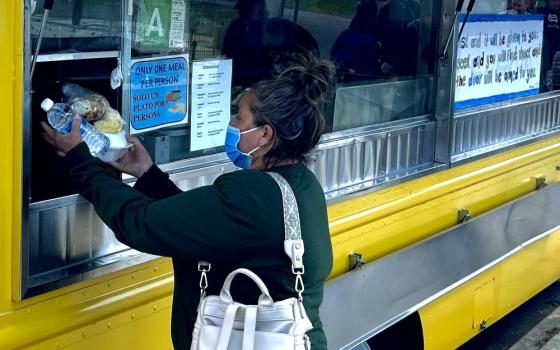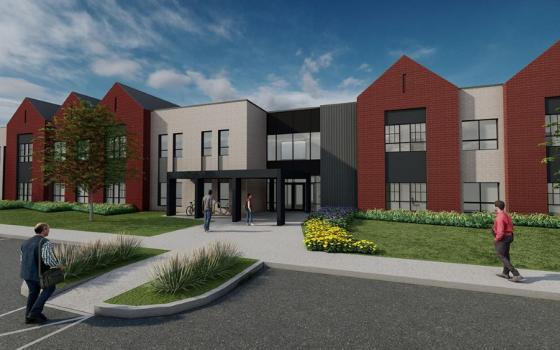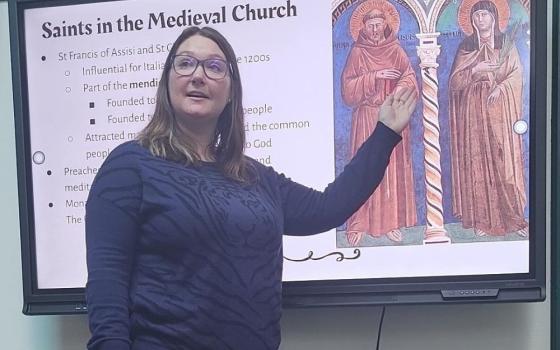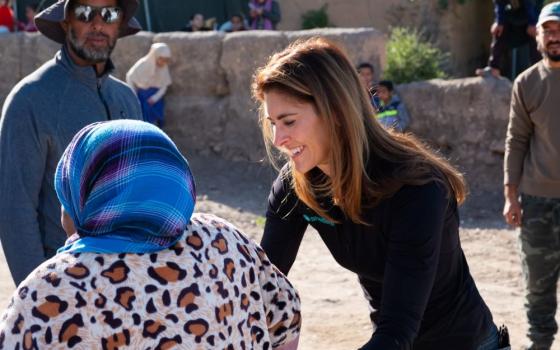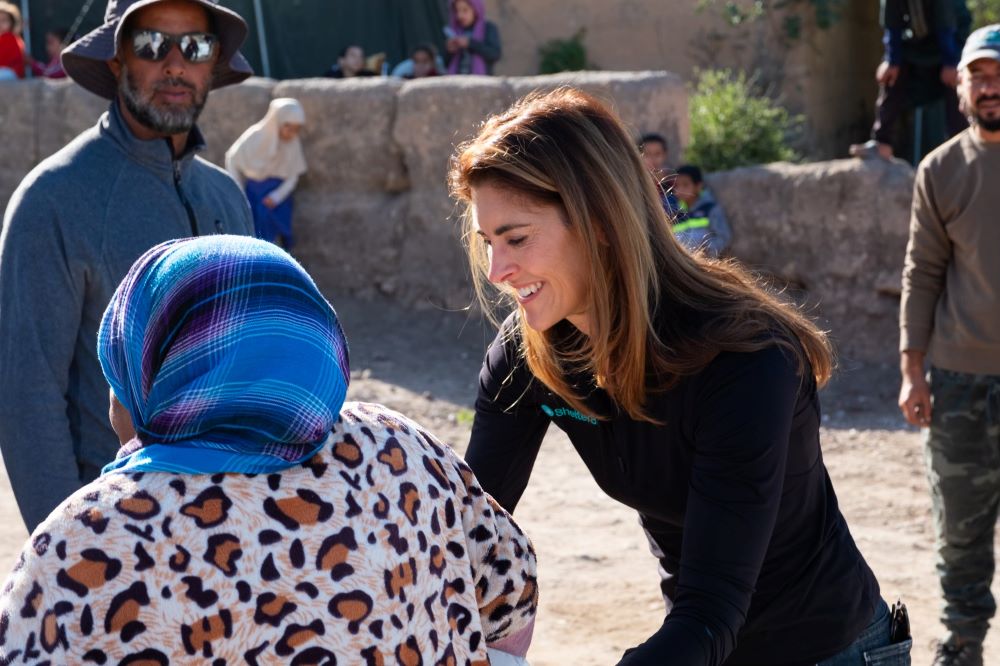
Kerri Murray, president of ShelterBox USA, interacts with townspeople in the Atlas Mountains in Morocco in November. Most of the homes there were destroyed in a 6.8 magnitude earthquake Sept. 8 that killed about 3,000 people. Murray says that despite differences in language, ethnicity and religion, people all over the world value family, faith, friendships and community. (Courtesy of ShelterBox USA)
In a Las Vegas hotel meeting room on a Saturday morning in December, 50-some volunteers of ShelterBox USA sat with equal doses of inspiration and humility. The ambassadors, as they are called, focused on Kerri Murray, the nonprofit organization's president for the last eight years, as she moved through a PowerPoint presentation of graphics, photos and charts that explained the accomplishments of the nonprofit disaster relief organization over the last year.
Murray could also give a firsthand account of a trip she took just weeks earlier to the Atlas Mountains in Morocco. ShelterBox had responded to some of the tens of thousands of people displaced by a 6.8 magnitude earthquake on Sept 8, which killed nearly 3,000. Murray emphasized that it was evident local relief agencies and government offices were only able to respond with limited efficiency.
This was nothing new for ShelterBox, which, in 24 years of existence on the global level based in the United Kingdom, has been able to connect directly with more than 3 million left homeless by natural disasters and conflict. ShelterBox's prepackaged survival kits, custom-made for every situation, can contain essentials that include high-performance tents, stainless steel cooking sets, solar lanterns, water purification kits, blankets, bedding, tools and hygiene packages.
But the work is far from over as more than 110 million people are displaced at some point around the world today.
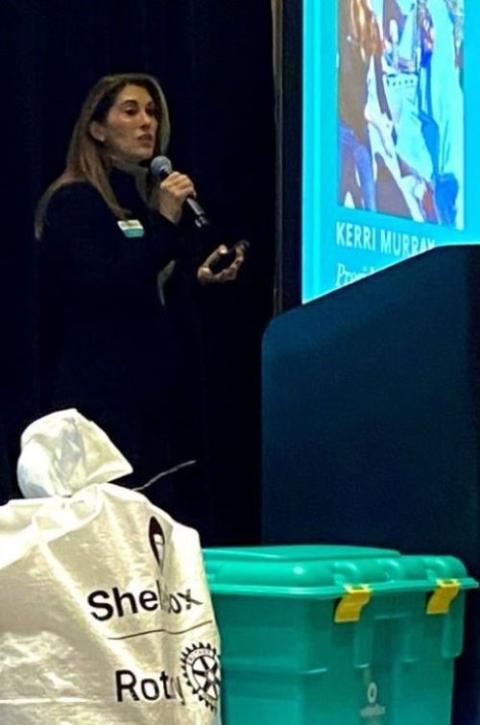
Kerri Murray, president of ShelterBox USA since 2015, addresses a Las Vegas ballroom of ambassadors during an annual appreciation gathering on Dec. 2. (Tom Hoffarth)
"We have a heavy responsibility to do more," Murray told the energized room, many affiliated with the Rotary International.
On a personal level, Murray finds that responsibility related to her Catholic roots, shaped in Naugatuck, Connecticut, and accelerated at Providence College in Rhode Island.
The 50-year-old Murray, based in Summerland, California, just outside Santa Barbara, discussed with the National Catholic Reporter how her value system based on a Catholic upbringing has led to this moment. Following is our Q&A, edited for clarity and length.
NCR: How would you describe the ways your Catholic faith mesh with your work at ShelterBox?
Murray: We're in a world that's very divided, and I work for an organization that's not only apolitical but nonreligious. We have to separate ourselves from the politics and maintain that level of focus on the humanitarian needs. But I also do feel in the work that we do, those who tend to gravitate toward helping are people of faith — and particularly people from the Catholic faith.
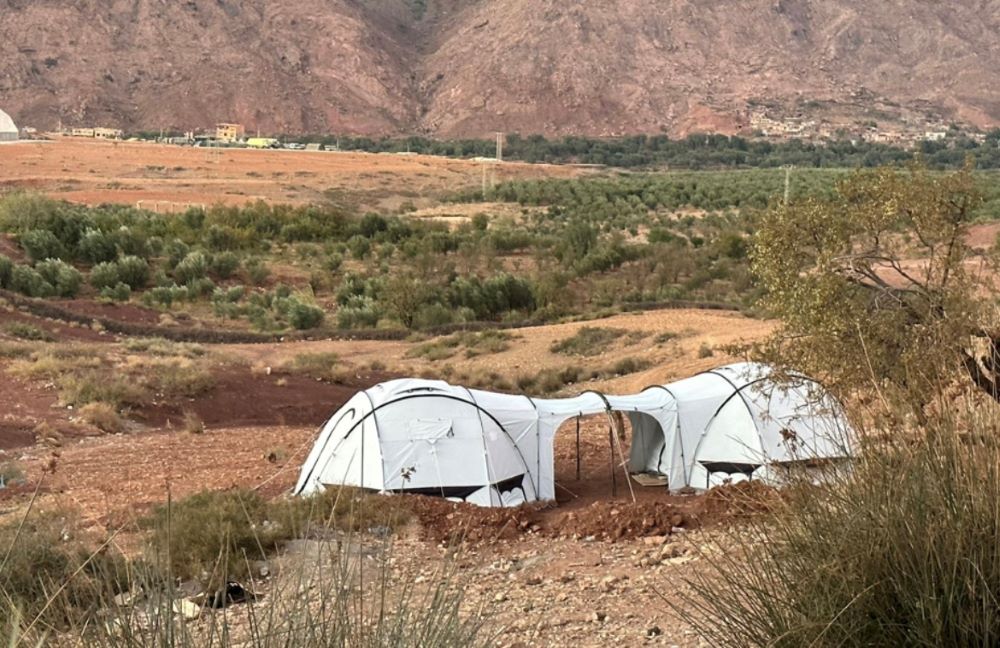
ShelterBox tents in Morocco in November show how villagers set up their new homes. Survivors of the 6.8 magnitude earthquake on Sept. 8 could also be seen putting wooden fencing around the tents, planting crops and making additions to their new homes. About 3,000 people were killed in the earthquake. (Courtesy of ShelterBox USA)
My faith has been important in how it guides me to making decisions and the values I underscore through my life, not just in a humanitarian sense but also as a mother (of a 19-year-old daughter). The most important trait that was woven throughout my upbringing in the church was empathy, having the ability to understand and feel another person's feelings. My faith was instrumental in living a life of service, caring for others and giving what you have.
I believe I developed a sense of consciousness growing up in a family of deep faith, and I feel a massive responsibility to help others, particularly those much more vulnerable. In disasters and conflict zones, those most often are women, children, the elderly and the disabled. At ShelterBox, we focus our humanitarian efforts on the poorest and most fragile places in the world, locations where people don't have a safety net in a disaster.
What are some of the important markers growing up that connect you to social justice principles and a belief in equity for all?
My family grew up very working class and we went to church weekly, did all the sacraments. Not a lot of extras for my parents working hard with three kids. It wasn't uncommon to pull the cushions off the couch to try to find quarters so my mom could buy milk. I look back now and it was just another family struggling to make ends meet but I found my family always giving to others.
My parents had a very small home goods store on Church Street, which was the main street, and I worked there after school. They were always quietly helping others. I would see Rocky come in to collect bags of aluminum cans that could be recycled for his dialysis treatment. There were the regular people from our community who came by to borrow a couple of dollars in the beginning of the week that they would pay back at the end of the week.
Your parents steered you into a Catholic school upbringing as well. How did that play out?
My primary education, K through eighth grade, was at the school next to St. Francis of Assisi Church, the same grammar school my father went to. My brother worked in the rectory. My dad volunteered on church projects. Sadly, St. Francis School closed in 2018. I remember in grammar school when the Challenger space shuttle disaster happened. My dad and I wanted to do something. We used fabrics from the store and made a huge felt banner that hung in the school's main office for years titled, "Let Us Not Forget," a remembrance to the astronauts and the teacher who lost her life.
I think that moment of grief was indicative of wanting to be of action and service. In the eighth grade when they were giving out superlatives like, "Best Looking" and "Most Popular," I was given, "Most Service to the School" — maybe not something that everyone would have wanted, but for me, I felt optimistic and helpful. I have always wanted to be one of those people who left something better than I found it. It was as simple as that. I was very proud of that recognition. From there, going to Holy Cross High School in Waterbury, those were some of the most important and formative years of my life.
Moving onto Providence College and launching into the business world with a political science and business degree had to take all that social justice work to another level, right?
Providence College was another community of people of faith, but also an area where I had the opportunity to lean in and get involved in more things interesting to me — working in the public defender's office, service with women in prison, getting involved in environmental issues and becoming the first lobbyist for the Save the Bay organization. In my senior year at Providence, I had an interview with the Peace Corps and they informed me that they needed people with specialized skills — engineering, farming, teaching. I knew I wanted to gain more skills and go back to serve again, but I didn't know where.
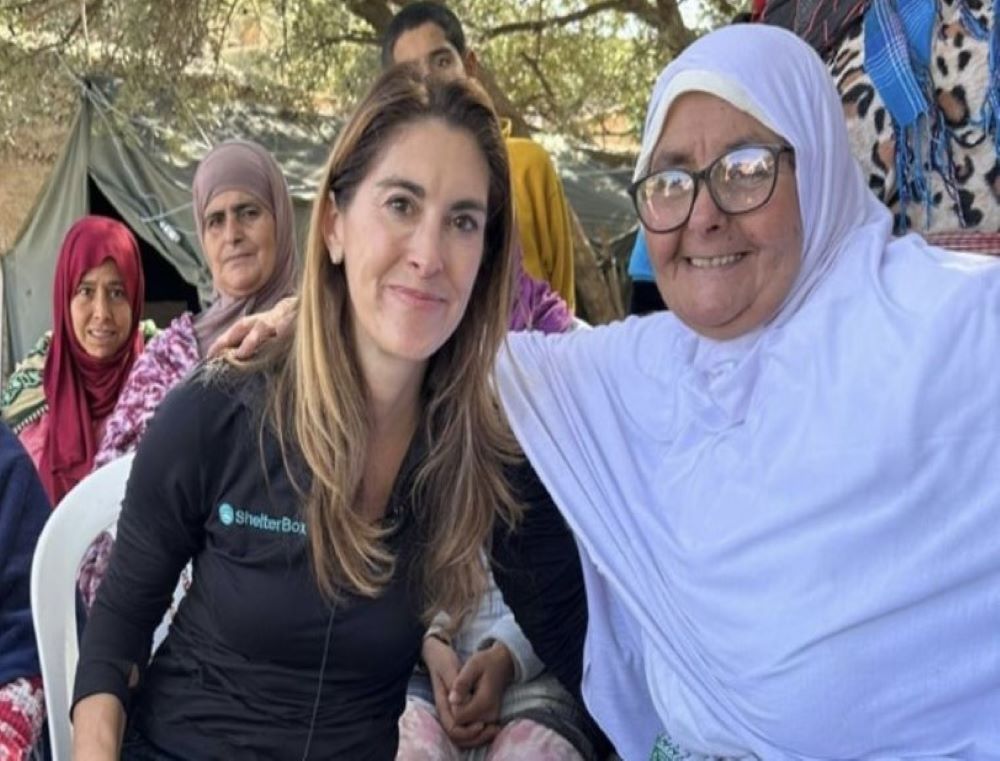
Kerri Murray, president of ShelterBox USA, sits with Fadma, whose husband was crushed in the Sept. 8 earthquake in Morocco. Murray gave the widow relief supplies, and Fadma — wearing white as a sign of mourning — took Murray to the site of her destroyed home. (Courtesy of ShelterBox USA)
Since I needed to pay back student loans, it meant going into corporate life for 14 years at the large pharmaceutical company, GlaxoSmithKline. In 2009, the company piloted the Pulse Program, taking executives and sending them to nonprofit organizations to transfer skills to humanitarian relief organizations. I was just a single mom at the time with a 5-year-old, but for six months, I picked up and moved with my daughter to help transform a 60-year-old medical relief organization, lending them my business skills.
One month into my role — in January 2010 — a massive earthquake devastated Haiti, killing more than 250,000 and displacing millions. I had little experience in disaster relief but learned quickly that I could apply the skills I acquired in business and help this nonprofit which was saving lives in Haiti after the earthquake. I traveled to Haiti, and one of the first places I went was just awful — a morgue in an overwhelmed hospital that was used to store bodies of young children who were victims of the earthquake. I felt immediately connected to those people and the trauma they experienced, and I knew then that my life's work was better leveraged in helping the most vulnerable people recover.
I stepped off the corporate ladder and worked to transform that medical relief organization for five years. By the end of 2015, it led me to join ShelterBox USA as its president and I can't imagine doing anything else.
Advertisement
ShelterBox has worked in the Ukraine, Ethiopia, the Philippines, Cameroon, Yemen, Turkey, Syria and more. Your relief work has enabled you to experience a variety of religious beliefs and customs. What do you find universal among the faith cultures?
When I was recently in the affected villages of the Atlas Mountains of Morocco and people were speaking Berber, we worked through translators to communicate. I felt an immediate connection to the people we were serving and everywhere we worked I was reminded that despite any cultural or religious differences the things we hold most dear, the things we value and appreciate are very similar. Family, faith, friendships and community are threaded throughout every place I have been.
In Morocco after the earthquake, I met many women dressed in all white who were widows. Moroccan people wear white rather than black while grieving, as they associate white with calmness and tranquility. I met a woman named Fadma, whom I gave cooking sets and relief supplies early in the day, and she came back to share with me the story about her husband who had been crushed in the earthquake. She took me to her destroyed home. We quickly built a bond and by the day's end, she was so overwhelmed with emotion that she hugged and held me. She remarked that she couldn't believe people from the United States came to help her in her time of need. In those moments, it's the ability to heal — not just with the physical goods, but those emotional needs we help do through the grace of God. It meant so much to her, but it meant even more to me.
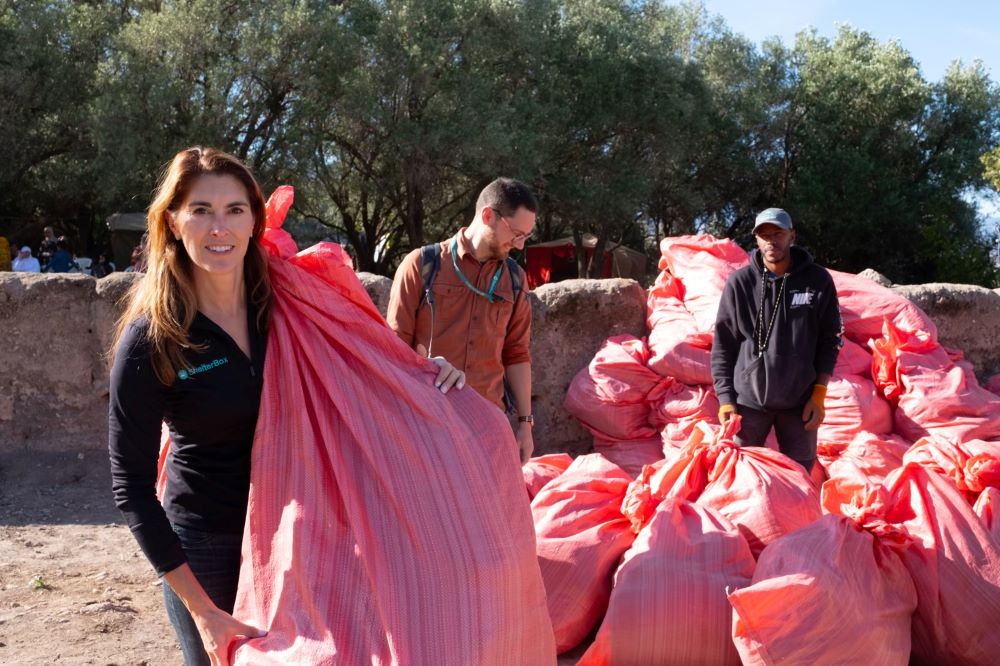
Kerri Murray, president of ShelterBox USA, hands out bagged supply kits in Morocco in November, about two months after a 6.8 magnitude earthquake killed about 3,000 people. Murray says stainless steel cookware sets are invaluable. Many survivors are widowed women who must cook for their families. (Courtesy of ShelterBox USA)
You seem to have a unique capacity to not only have that business experience of important fundraising for this program but also the empathy to be there at the sites, resourceful and nimble to listen to their needs. That is not a common combination, is it?
Different people have different gifts. I think for me it is connecting to the people we are helping with a deep sense of compassion. My role is to then translate that and amplify their voices. Working on the frontlines, sure, we give people tents and tarps and solar lights and tools — that's the first step in the recovery process. But we give people hope too, coming from across the world to care about them.
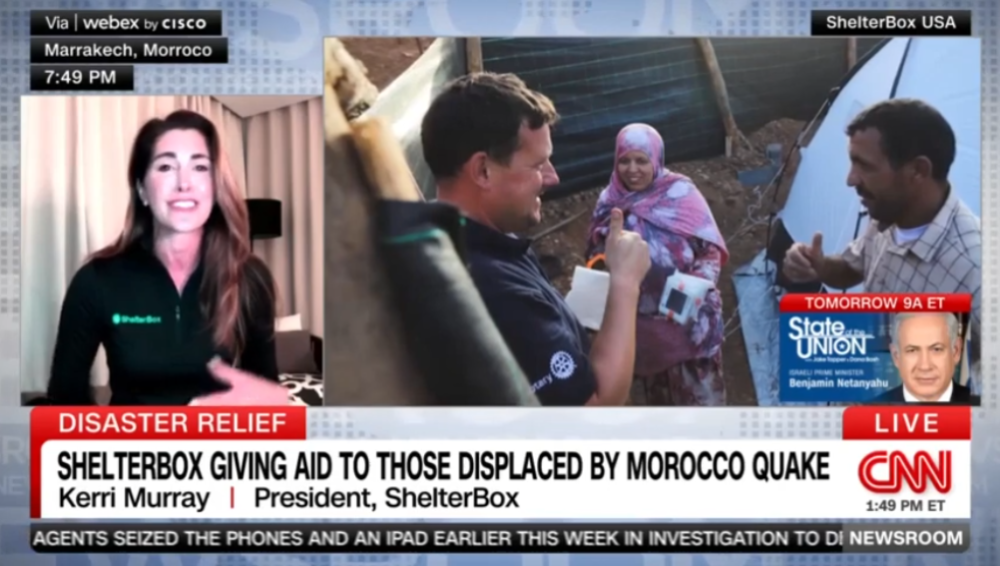
Kerri Murray, president of ShelterBox USA, appears on CNN in November for a story on ShelterBox's assistance following the Sept. 8 earthquake in Morocco. (Screenshot/CNN)
In your presentation, you pointed out that ShelterBox USA believes conservatively more than 200 million will be displaced by 2050, and as many as a billion. You are also in a position to educate those who might not fully understand why your organization is needed more than ever. Your presentation in Las Vegas also set a goal to make more people aware of how climate change is contributing to these increasingly major natural disasters. It is part of Pope Francis' 2015 encyclical Laudato Si', about care for the planet. How can your Catholic faith advance that kind of messaging and communicate that as part of your outreach?
The poorest countries have done the least to cause the problem, but they are being hit the hardest by more intense droughts and floods and storms. It's vital for humanitarian relief organizations to build resources for people to be better prepared for disasters that are becoming more intense and displacing even more people. It's not an "if" but "when" situation for many countries endemic to disasters. Our work is increasing so much. I do see what is unique and special to the Catholic faith is people caring about other people and wanting to go out across the world aside from helping locally. These are people you'll never meet, but whose lives you are transforming. I hope organizations like ours can connect the world that way.
Your ShelterBox mission statement talks of supporting "the world's most vulnerable people … as we listen and adapt our support to the needs of each community." You must feel like a missionary in some ways?
I would say yes. Tapping into all the things I'm uniquely given as gifts and working through my faith has allowed me to be there. The one thing I have always noticed about disasters: In the worst of times, you see the best of humanity.
[This article was made possible by a grant from the Hilton Foundation.]
